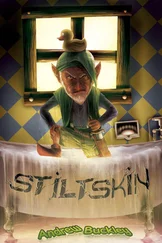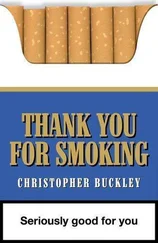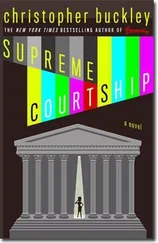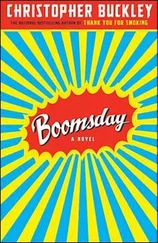Charley was no good at waiting-most self-made rich people aren't; Felix was. His eyes never strayed from the top floor of number 316.
Charley checked his watch for the one-hundredth time. Just after 3:30 A.M. Better not drink any more coffee. He was jittery enough and he was tired of pissing in the alley. He stared at the boat in the vacant lot next to number 316. What was a boat doing on East Eighth Street between Avenues B and C?
Her lines reminded him some of the first boat he got work on out of Port Aransas after running away from the orphanage. She was eighteen, maybe twenty feet, and riding a wave of smashed-up chunks of white porcelain from old toilets and urinals, heaved out the building, probably, that used to occupy the lot-afloat on a sea of crappers. There was a ratty old heavy black armchair with springs and foam stuffing coming out sitting on her foredeck. Charley wondered who sat in it on hot summer nights, drinking wine and dreaming of black marlin. She had a name. It was spray-painted large on her hull: NOAH'S 8 THSTREET YAGHT . Everything in this damn city was either misspelled or in Latin. He imagined God, fed up, with the enormity of the city's sins, loosing forty days and nights of acid rain and Noah's 8th Street Yaght rising up higher and higher, even higher than the World Trade Center, and coming to rest in the suburbs, atop Mount Kisco, the dove returning to Noah with a letter from the zoning commission saying his ark was in violation of local codes.
His eyes strayed to the car in front of them, a red Chevy, abandoned, up on blocks, the windows smashed in, glass all over, seats stripped. It had Connecticut plates and there was a bumper sticker proclaiming, somewhat risibly in the present context, BRAKE FOR WHALES. Whales were not a major concern in Alphabet Town. Here the mottoes tended more to: CRACK KILLS. LA LUCHA CONTINUA. OUR CHILDREN ARE DYING. A sidewalk Siqueiros had been busy painting heroic murals of veiny forearms impaled by hypodermic needles, eyes exploding from pent-up crack smoke. Someone had copied Edvard Munch's "The Cry" in a blackened doorway littered with vials and dried vomit. In Alphabet Town art was not for witty aperqus in rooms full of Chardonnay; it tried to keep you alive. But what, Charley wondered, did it mean: YOUR DICK IS IN YOUR HAND WAKE UP 1933?
Felix stirred in the passenger seat beside him, and now even Felix checked his watch. 3:56. Charley knew nothing was going to happen tonight-in his soul, he knew it, and knowing it made him hungry.
"You want a sandwich?" Felix said he'd have a roast beef if there was one left. He said he was tired of eating cucumber sandwiches. The chef was English. Charley found one that looked like roast beef and gave it to him. The thin sandwich was tiny in Felix's hand, all out of scale.
"How come"-Felix chewed-"he always cuts off the crusts? I never understood that."
"'Cause he's English. The English are more civilized than us. Margaret was always saying that."
"Why is cutting off the crusts civilized?"
Charley considered. "They feed the crusts to the pigeons so the pigeons don't have to eat garbage. The English eat a lot of pigeons, see."
"That doesn't sound civilized to me. I wouldn't eat pigeon."
"Hell, I don't know. What'd you used to talk about when you did stakeouts?"
"Getting laid. The Mets. How come the English cut the crusts off their sandwiches. That was a big topic of conversation."
Voices crackled over the police scanner. "Ten-sixteen, holding one. New York, one-five-six, Oscar Peter Bravo." Felix said they were checking a license plate. "Ten-ten, pick up aided case, Twelfth and Avenue D. Send a bus."
"Bus," said Charley. "What's that?"
"Ambulance."
"Aided case?"
"Someone needing assistance, alive or dead." The thought took form simultaneously between them: the blue skin, the open jaw.
Felix said, "We used to play this game. The boundary between the Ninth Precinct, where I was, and the Thirteenth is along Fourteenth Street, right down the median strip. Some guys from the Thirteenth would find a body on their side of the line. These bodies, they could be real unpleasant, so they'd haul it across the street and put it on our sidewalk and call it in as one of ours. We'd get there, and you could always tell if it had been moved, so we'd haul it back across the line and call it in and say: No, uh-uh, it's one of yours. And they'd come and haul it back and say: No, it's yours. Sometimes this went on for hours, back and forth, these poor stiffs getting dragged back and forth, back and forth."
"That's a terrible story," said Charley.
"Yeah, but now you're not thinking of her anymore." Felix sat up. "Here we go."
Charley said into the radio, "Uncle Bob, Uncle Sam." They were using NYPD radio codes: "uncle" for undercover.
"Uncle Bob."
"Stepping out."
"Roger."
Two men came out of number 316, walked down the stoop and turned east on Eighth Street, toward Avenue C. One of them was Ramirez. "Shit," said Felix.
"Who's that?"
"I don't know," said Felix. "Better let him go."
"No," said Charley. "I'm not sitting here another night." He said into the radio, "Uncle Bob. Go." Felix opened the door.
A blue van was parked in front of the abandoned Chevy. The side door slammed open and two men of considerable size jumped out, one with a Remington pump, the other a nickel-plated.357. They were wearing blue windbreakers painted with large yellow letters: DEA.
Ramirez and the other man turned and ran the other way but found themselves looking at Felix, also in a DEA jacket, pointing a Smith amp; Wesson Model 59.
"Federal agents," he said. "You're under arrest." The two DEA men took them from behind and spread-eagled them over the remains of the Chevy that once braked for whales.
"Toss 'em," said Felix. The DEA men frisked them. They pulled a Tando knife out of Ramirez's boot and a packet of tinfoil out of the front pocket of his jeans. Inside were two dozen tiny plastic Ziploc bags of crack.
"Hey, man," Ramirez said, "these aren't my pants." Amazing, the things they would say.
One of the DEA guys laughed. "Those aren't your pants? "
"No, man, swear to God."
"He says they aren't his pants."
Felix said, "Are you Emiliano Ramirez?"
"No."
"But those are Emiliano's pants. You're in violation of USC 841-3-1. You have the right to remain silent, anything you say can and will be used against you in a court of law you have the right to a lawyer if you cannot afford a lawyer one will be appointed for you do you understand these rights? Comprende sus derechos? "
"Yeah yeah, man. Look, these aren't my fuckin' pants, man. I was up there, I put on the wrong pants."
"You put on the wrong pants?" Felix stared. "I'm going to have to talk to your valet, then." He turned to the other man. "What's your name, my man?"
"Ramon."
"What's your problem, Ramon?"
"I got no problem with you, man."
"I think you do. You been hanging out with my man Emiliano. I think you got a serious problem."
"No, man, no problem. I ain't hanging out with him."
Ramirez said, "These are his pants, man. He loaned me his pants."
"Hey, fuck you, man!"
"Friendship," said DEA. "It's a beautiful thing."
"Okay," said Felix, patting Emiliano's shoulder, "this one into the choo-choo. We're going down to the federal lockup, Emiliano. I hope whoever's pants those are put a toothbrush in them." One of the DEA men handcuffed Ramirez and put him inside the van.
Felix said, "Okay, Ramon." Ramon lifted himself off the hood. His hands were shaking. "I don't want to see you again, Ramon. Ever, do you understand?"
"No problem, man."
"If I ever see you again, I'm going to be unhappy."
Читать дальше











